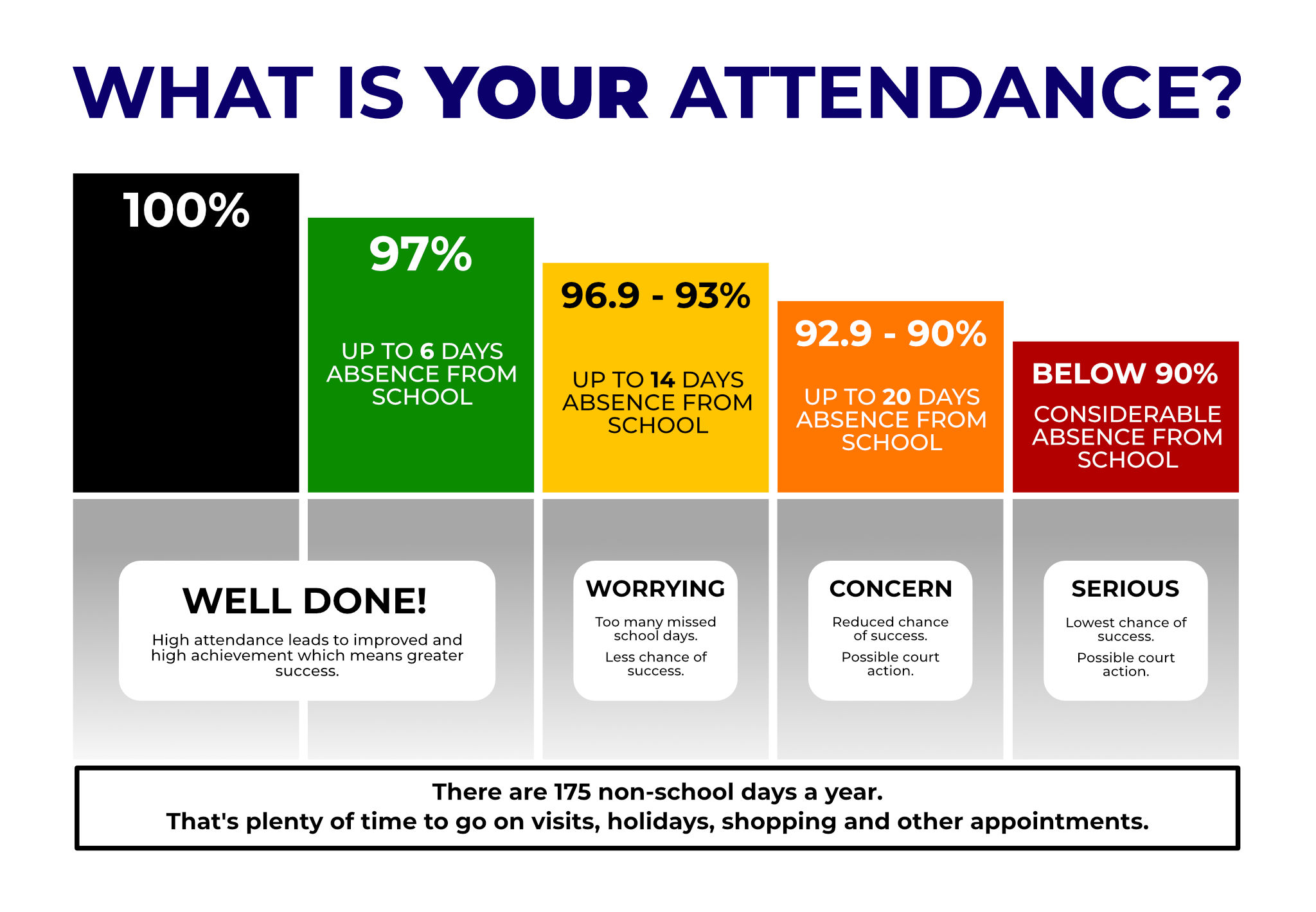
- Home
- /
- Attendance & Punctuality
Attendance & Punctuality
The Whitby High School places great importance on attendance and punctuality. It has been proven through numerous studies that students who have good attendance achieve well and develop important social skills. The Whitby High School expects that students will have at least 97% attendance.
Frequent absence is a serious problem for pupils as much of the work they miss is never made up, leaving these pupils at a significant disadvantage for the remainder of their school career.
At present, the main reason for a pupil absence from school with in The Whitby High school is illness. When deciding whether your child is too unwell to attend school ask yourself the following questions:
- Is my child well enough to do the activities of the school day?
- Does my child have a condition that could be passes on to other children or school staff?
- Would I take a day of if I had this condition?
Think carefully before keeping your child from school for medical reasons. If they wake up saying they are unwell, consider whether the symptoms mean they have to stay at home.
Do not keep your child away from school ‘just in case; when they could be in a class learning with their friends.
If a child should feel unwell, parents/carers need to contact the school office by telephone, text or e-mail at their earliest opportunity. The school must be informed each day thereafter. Pleas ensure the school is contacted about the absences. If school is not notified of the reason for the absence, it will be ‘unauthorised’.
Students are registered electronically and if a student is absent without explanation, automatic texts will be sent to parent /carers. This is an important part of our safeguarding procedure within school. To avoid any mistakes, good communication is vital.
Medical Appointments
Every effort should be made to arrange appointments outside of school hours. If this is not possible, the appointment card or letter should be shown to reception.
Type of Letter - What does it Mean
The school has a clear set of procedures to monitor attendance. The government classes any student with an attendance rate of less than 90% as ‘persistently absent’. Should a child’s attendance fall persistently below 95%, a series of letters will be sent out and different procedures put into place.
Stage 1 – there is a general concern about your child’s attendance, this letter is designed to alert you to this, and the effects absence has on a child’s education.
Stage 2 – This means your child’s attendance is becoming a concern. Further absences will not be authorised unless the school receives medical evidence. This may be a copy of a prescription or doctor’s note.
At any stage you may be invited in to meet with the House Progress Manager (or Senior Staff in his/her absence) and a member of the School Attendance Team. Targets and support plans will be developed in the meeting.
A Fixed Penalty Notice may be issued if parents/carers fail to attend these meetings.
Cases, which move beyond ‘Stage 2’, may trigger Local Authority Proceedings.
Please remember an attendance rate of 90% equates to one day of absence per fortnight. Even a rate of 95% equates to ten days every school year. This is considerable and in the world of work, employers would be concerned about such a figure. We realise that some students do have genuine illnesses and medical conditions. The school will do whatever it can to support such students. Again, good communication is the key.
Students are expected to be punctual to school. The school day begins at 8.30 and students are expected to be on the premises by 8.25. Students will be kept by their tutor at the end of the day if they are late. Persistent lateness will lead to further sanctions.
Remember, every minute counts. If a child is ten minutes late every day, this equates to nearly seven days of absence from lessons over a school year.
Leave of Absence from school (namely holidays)
The school does not encourage any leave of absence to be taken during term time. We recognise that holidays can be much cheaper during term time and that work commitments can make taking holidays during school breaks difficult, but doing this can be disruptive to both children’s learning and the school. The government has issued strict guidelines to schools regarding leave of absence for students. Under these guidelines, Head teachers are not able to grant leave of absence for students during term time unless there are exceptional circumstances and please be advised there are very few exceptions.
Should parents/carers wish to seek leave of absence for their child, please complete the below form and return to school. Please include the form fully, adding any evidence to support the application. Each case will be considered on its merits. The Head teacher will determine the number of school days a child can be away from school if the leave is granted.
ESBN - Emotionally Based School Non-attendance
Emotionally based school Non-attendance refers to severe emotional upset experienced by a child at the prospect of attending school. EBSN is different from truancy were a child ‘won’t go to school’. Children experiencing EBSN often want to go to school however; it can be emotionally too difficult them. They then try to avoid the emotional distress by not going to school, which then makes it harder day after day.
‘It’s more like “I can’t cope”…. I could not cope with big situations’ (Yr10 student).
CYP with EBSN typically experience high levels of emotional distress or anxiety in relation to attending school. They may present with one or more of the following behaviours:
- crying or pleading refusal to get up, to get ready for school or to leave the house
- excessive worry around school-related issues
- sleep difficulties
- complaint of illness which may be psychosomatic (e.g. headache and tummy ache, occurring when no underlying medical cause can be found and the basis is thought to be emotional)
- Defensive aggression, usually at home.

